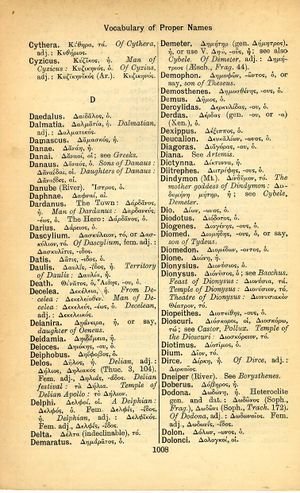Dione
τῶν δ᾿ ἄλλων τῶν νοσηματικῶν ἧττον μετέχουσιν αἱ γυναῖκες → apart from this one, women are less troubled by maladies
English > Greek (Woodhouse)
Διώνη, ἡ.
Latin > English (Lewis & Short)
Dĭōnē: ēs (-a, ae, Cic. N. D. 3, 23, 59), f., = Διώνη.
I The mother of Venus, Cic. l. l.; Hyg. praef.; Claud. Rapt. Pros. 3, 433.—Hence, Dĭōnæus, a, um, adj., of Dione: vestis, the garment worked by Dione for her daughter, Claud. Epith. Pall. et Cel. 102.—Far more freq. as in Greek,
II Venus, Ov. F. 2, 461; 5, 309; id. Am. 1, 14, 33 al.—Hence, Dĭōnæus, a, um, adj., of Dione (Venus): mater, Venus herself (with reference to Aeneas), Verg. A. 3, 19; hence, Dionaeus Caesar, as the descendant of Iulus, Aeneas, and consequently of Venus, id. E. 9, 47: columba, sacred to Venus, Stat. Silv. 3, 5, 80: flores, Col. 10, 286: antrum, Dione's grotto, as the scene of love and love-songs, Hor. C. 2, 1, 39.
Latin > German (Georges)
Diōnē, ēs, f. u. Diōna, ae, f. (Διώνη), I) eine Titanin, Tochter des Oceanus u. der Tethys od. (nach andern) des Äther u. der Gäa, Mutter der (dritten) Venus, Cic. de nat. deor. 3, 59. Claud. rapt. Pros. 3, 433. Hyg. fab. prooem. p. 3 M. – II) appellat. = Venus selbst, Ov. am. 1, 14, 33 u.a. – Dav. Diōnaeus, a, um (Διωναιος), zur Dione (Venus) gehörig, dionëisch, mater, d.i. Venus, Verg.: Caesar (als Nachkomme des Äneas, des Sohnes der Venus), Verg.: antrum, der Venus heilig, Hor.: ebenso columba, Stat.

